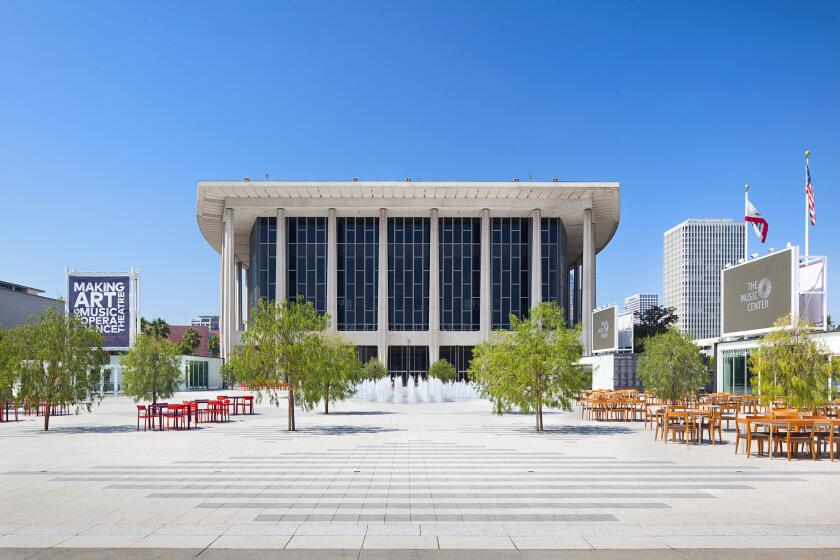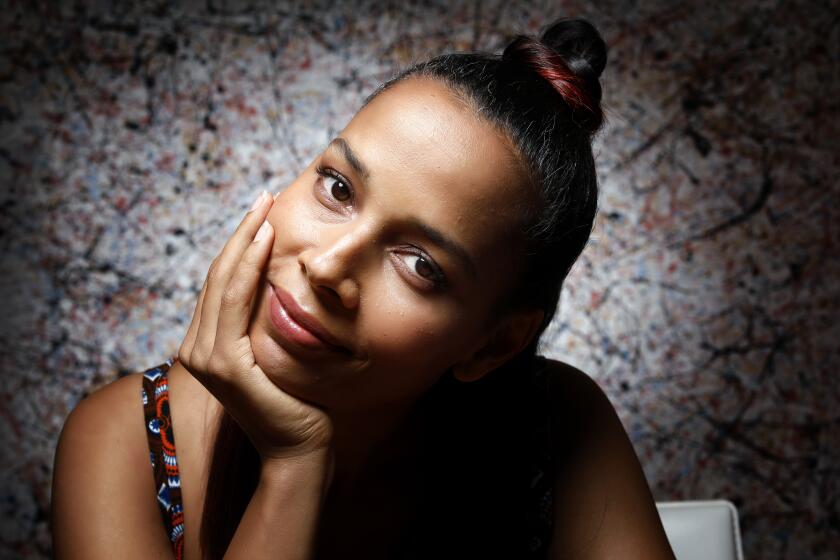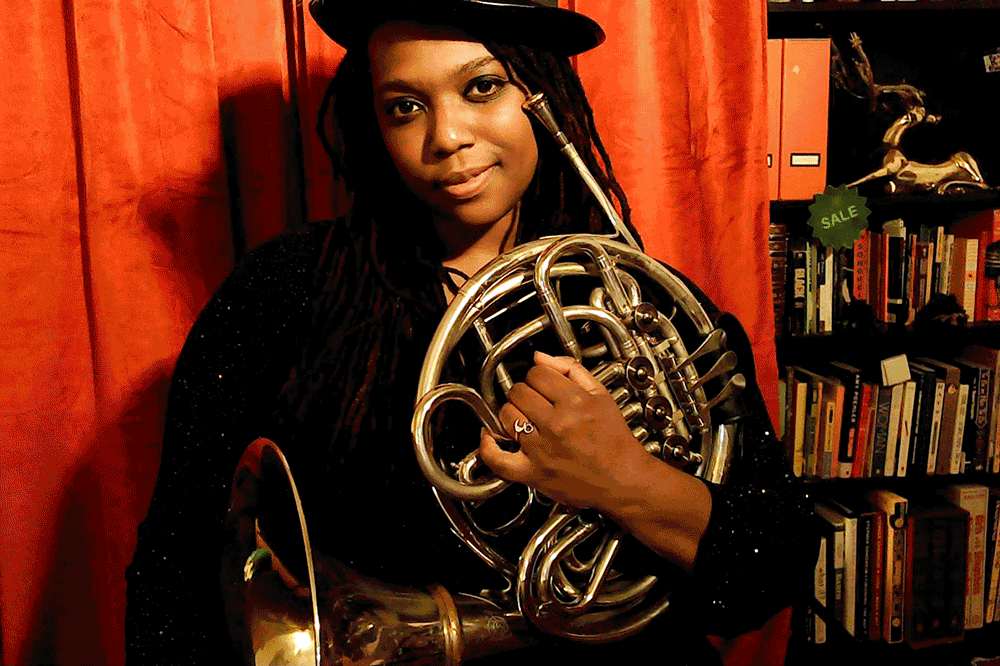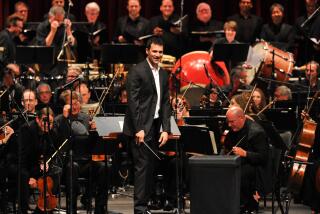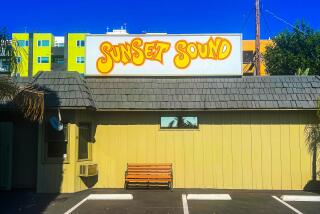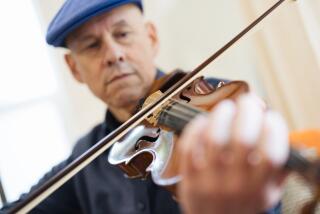COVID-19 changed how movie and TV music gets made. L.A. musicians learn to improvise
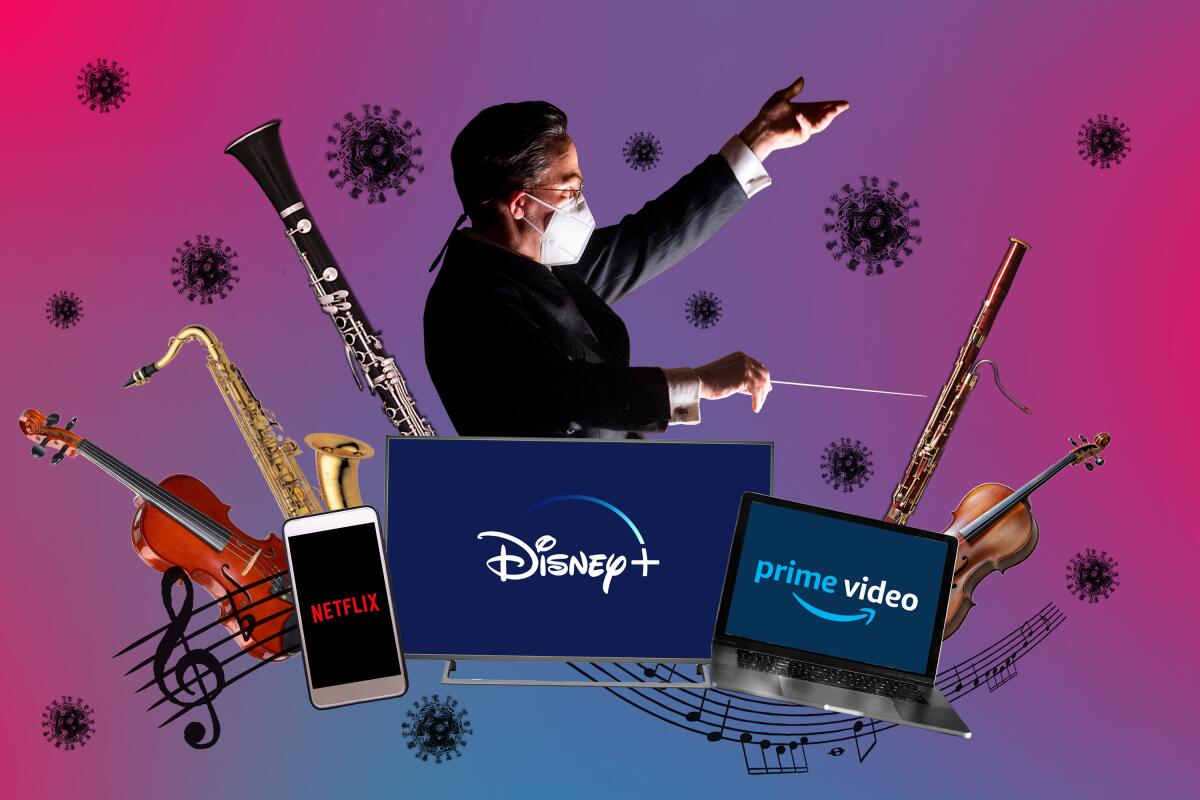
The historic scoring stages of Hollywood — where orchestras record the music for IMAX blockbusters and Netflix binge-watches alike — stood empty and silent last year. The COVID-19 quarantine banished musicians to their closets and bedrooms, where solo players recorded files and sent them into the digital void for an engineer to blend into a patchwork symphony.
“Tenet,” composed by Ludwig Göransson, recorded its score that way. “Bridgerton,” with music by Kris Bowers, did too. So did “Lovecraft Country,” the HBO series scored by Laura Karpman and Raphael Saadiq, as well as “Mrs. America,” “American Dad” and a slew of other shows.
The plague year proved the ingenuity of musicians, as well as the composers who write for them. But it also opened new cracks — and exposed old ones — in the post-pandemic job market of musicians who make their living recording scores in L.A.
The reality is, these stages were already under threat. Paramount, Disney and Universal all had large recording stages, but each has been dismantled or converted into smaller dubbing rooms. Of the 18 or so large scoring stages that operated during the heyday of Hollywood, only Fox, Sony and Warner Bros. remain. For the last decade, Sony — formerly MGM, where classic musicals such as “The Wizard of Oz” were recorded — has often been empty for weeks or even months at a time.
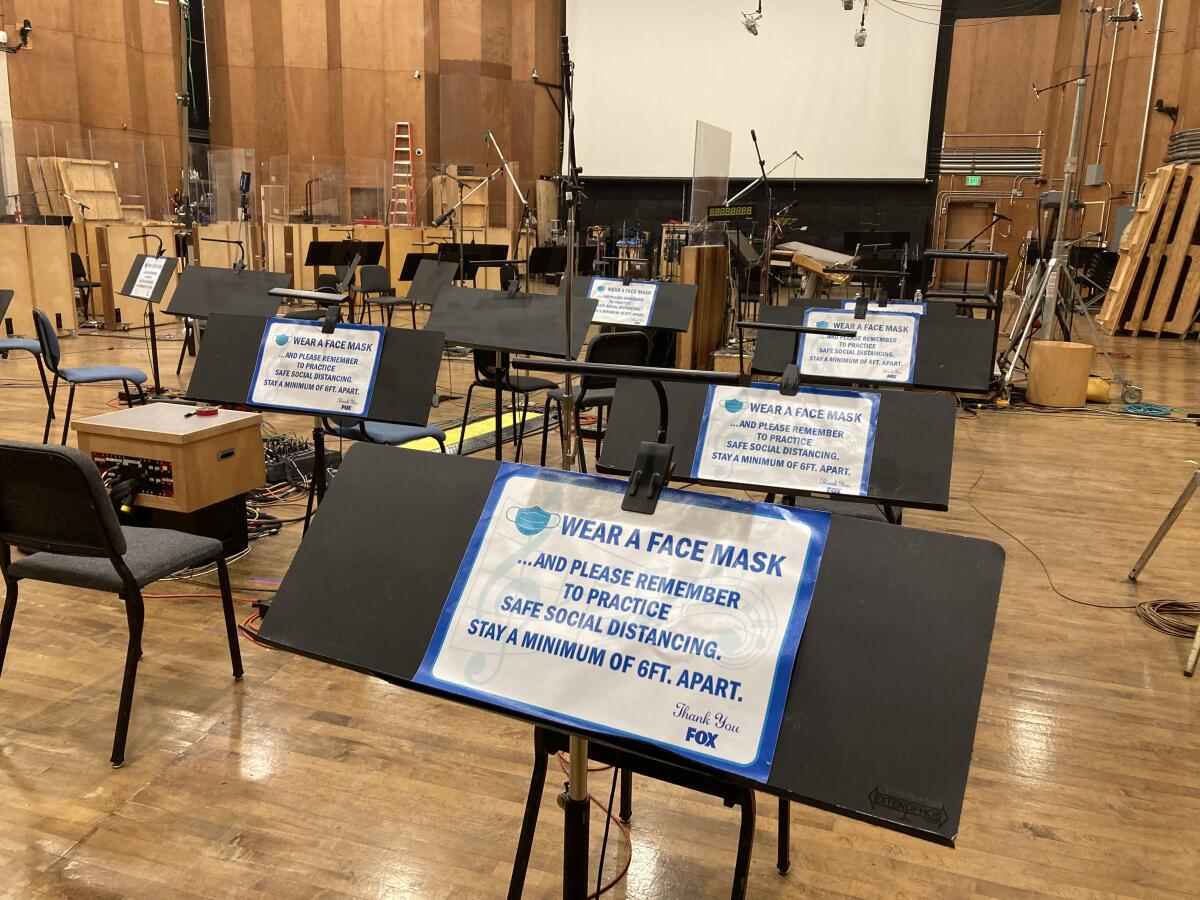
The community surrounding this recording apparatus has worried about the Fox stage ever since Disney bought the studio. But the Newman Scoring Stage — named after two of the founding fathers of film music, Alfred Newman and his brother Lionel, whose offspring include Randy, Thomas and David Newman — remained part of the independently owned Fox Studio Lot. Stacey Robinson, vice president of sound operations at Fox, said the operation is still being supported.
Los Angeles used to be a boom town for scoring musicians, with enough first-call players to fill three symphonic orchestras. Besides all of the movie and TV scores, numerous shows had live bands — not to mention the lush pop music of Frank Sinatra and his ilk, which provided even more studio time for orchestral musicians.
Today an estimated 150 to 200 players make their living recording scores — down from about 500 20 years ago, according to Dylan Skye Hart, a French horn player. Almost all of them supplement their studio work by teaching or by playing with regional orchestras and chamber ensembles.
The phenomenon of runaway work has worried L.A.’s scoring musicians for decades, with the soundtracks of many of Hollywood’s biggest films — not to mention the smaller and independent ones, as well as TV shows, video games and other media — recorded in London and in other (mostly European) cities.
The most frequently cited reason is the cost of hiring a union orchestra in L.A. Members of the American Federation of Musicians, and specifically Local 47, receive royalty payments on the back end, whereas orchestras in most other countries competing for scoring work offer one-and-done buyouts.
Does this mean Disney Hall, the Ahmanson, Mark Taper and Dorothy Chandler are safe from COVID-19? No, but the change adds a layer of safety, rep says.
When COVID-19 hit, Hollywood’s scoring stages went dark for four months. To get back to work, many musicians invested in home studios and gear, and through sheer practice they became very good at recording ensemble music by their lonesome.
The downside, of course, is that they had to act as their own engineer, said Gina Zimmitti, one of the main contractors who hire orchestras for local scoring sessions. And sometimes recording “at odd times in order to send the composer a clean track without a stray dog bark or street noise.”
Also, it’s a lonely way to make music.
Benjamin Wallfisch, composer of “The Invisible Man,” praised the tenacity of his musician friends but said that “recording at home can never replace the shared energy of a group together.”
“There’s just this intense desire to get back to it and to make music together again,” he added. “Musicians need each other. It’s a communal art form.”
Pandemic restrictions relaxed enough in July to allow small ensembles back onto the scoring stages but with new protocols: rigorous COVID-19 testing, distanced seating, masks and plexiglass shields between players, and no fraternizing between the instruments that blow air — and droplets.
The noted festival for new and experimental music will postpone rather than cancel, waiting for COVID-19 infection and vaccination rates to improve.
The Fox stage was the first of the majors to adapt, but it wasn’t easy or cheap. New air filters were installed, and the entire stage setup was rotated 90 degrees to accommodate the required physical distancing. That meant musicians were facing the air conditioning supply ducts, so the fan — installed in 1929 when the stage was built — had to be replaced with a quieter one.
“But we’ve managed to make it work,” said Robinson. “And, knock on wood, we’ve been staying pretty busy.”
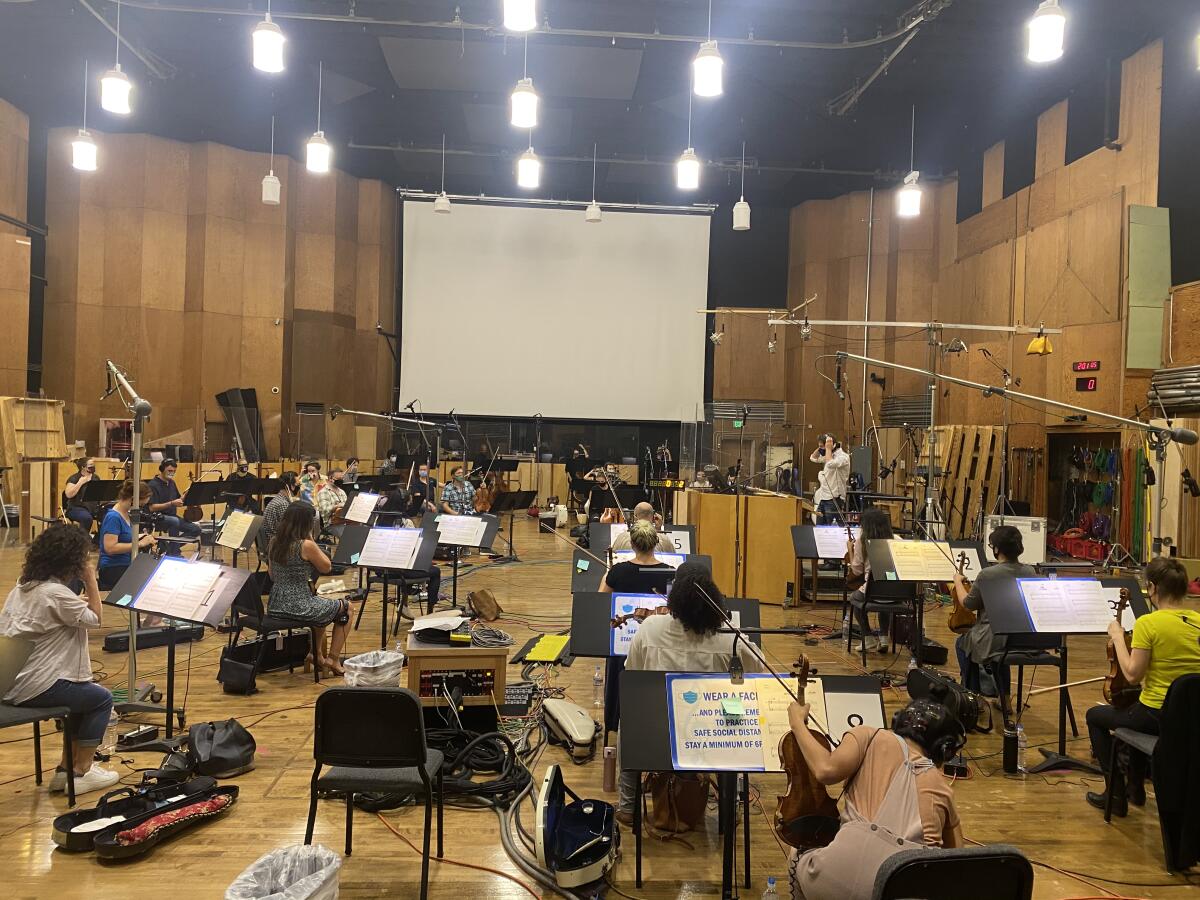
Since July, Fox has hosted scoring sessions for “West Side Story,” “Suicide Squad 2,” “Minions: The Rise of Gru,” “Coming 2 America” and “The United States vs. Billie Holiday.” The popular Disney+ show “The Mandalorian” was also scored there under pandemic protocols.
Because musicians have to record in smaller numbers, and in separate instrument sections, the stages have been in use more days. But all of this “striping” — recording strings separate from brass and woodwinds and so on — has illustrated that scores with the heft of a huge orchestra can be recorded a different way.
The pandemic-inspired resourcefulness of recording small groups or individual musicians, potentially anywhere in the world, and mixing their parts into a finished score, has the power to upend the tradition of gathering a hundred players under one roof. The L.A. gig musician is left even more vulnerable to overseas competition.
Belinda Broughton, a veteran concertmaster violinist, has long argued that L.A. would win back much of its lost work if the union got rid of the demand for back-end payments. But when the pandemic hit, and she didn’t feel safe going back to playing in person, those residual checks helped keep her afloat.
“I now see the benefit of it,” said Broughton, 62. “Maybe that’s humbling. You know — mea culpa.” But, she added, “I still think that it would help not to have them.”
Those secondary market payments were considered an insult to scoring musicians when studios pushed for them in the 1960s, because “it’s technically deferred wages,” said Hart, who was a trustee on the local union board for seven years. It was a savvy cost-saving device for the studios, which didn’t anticipate the advent of home video or streaming.
Hart, 38, doesn’t believe losing the secondary payments would increase work for local musicians, and he argues it would require raising their front-end pay — which isn’t that high. The rate for recording non-blockbuster projects is $60 an hour, which means a musician who knocks a smaller score out in one three-hour session makes $180.
Hart also teaches at Cal State Long Beach, where he gets his health insurance, but he remains optimistic about the future of scoring work in L.A. The decrease in session dates is just a reflection of how music gets recorded much more quickly and efficiently than in the old days, he said, and he pointed to companies like Disney and Warner Bros., whose contracts still require them to record most of their giant films in town.
As for the stages, “they’ve been saying Sony is going to close, for sure, for the past 10 years,” Hart said. “You know, if it happens, it happens. I don’t worry about things, because I think worry is a wasted emotion.”
Where gains need to be made, Hart said, is with the streaming companies — Netflix, Amazon Prime — which have exploded during the pandemic as producers of media that need music. A lot of that work isn’t being recorded with L.A. union musicians, but it’s a potential gold mine that, Hart said, just requires some relationship building.
Some older players who didn’t want to pivot to home recording or venture back onto the stages have retired or simply given work to their younger colleagues. Overall, though, “it doesn’t feel like our musician community has abandoned ship,” said contractor Zimmitti’s business partner, Whitney Martin.
“If anything, they have been practicing a lot at home and are waiting for a call to get back in the studio,” said Martin, noting the potential for musicians who, prompted by the pandemic, have set out to form their own ensembles, collaborate with artists across different genres or otherwise thought outside the traditional stage-recording box. “Those who don’t just wait for a call and also create new opportunities. I think they’re going to do even better in the next year.”
Violinist Melissa Tong landed her dream job playing a Broadway musical. Then the pandemic became the ultimate showstopper. She’s one of 11 classical musicians from both coasts who share their stories of struggle, survival and hope.
More to Read
The biggest entertainment stories
Get our big stories about Hollywood, film, television, music, arts, culture and more right in your inbox as soon as they publish.
You may occasionally receive promotional content from the Los Angeles Times.
